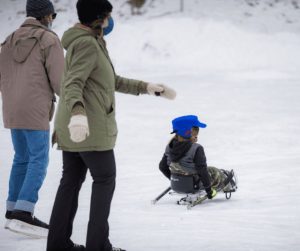
As the temperature takes a dip and snow starts falling, Michigan transforms into a winter wonderland. While this icy charm can be a call to adventure, it presents unique challenges, especially for those with mobility issues.
For instance, you have to wheel your chair with cold hands, navigate slippery sidewalks, and drive through blizzards with the focus of a Formula One racer — all while bundled up in a trillion layers that restrict your movement.
But does that mean you should tuck yourself away until spring returns? Absolutely not! In this guide, we’ll share insightful tips, practical techniques, and accessibility solutions for Michigan winter travel.
Michigan Accessible Winter Travel Tips for Wheelchair Users
 Whether you’re headed to a frosted-over lake in Lansing or a snow-dusted trail in Traverse City, it’s essential to prepare for Michigan’s intense winter weather. As a wheelchair user, you don’t just want to stay warm but also need flexibility and mobility for a super smooth experience.
Whether you’re headed to a frosted-over lake in Lansing or a snow-dusted trail in Traverse City, it’s essential to prepare for Michigan’s intense winter weather. As a wheelchair user, you don’t just want to stay warm but also need flexibility and mobility for a super smooth experience.
Here are some tips for getting around during winter:
- The key to warmth lies in layers! Instead of wearing a bulky coat, start with moisture-wicking materials closest to your skin, followed by insulating ones, and finally, a waterproof and windproof outer layer. This will not only keep you warm and toasty but also ward off the risk of hypothermia and frostbite.
- Cover your head with a wool hat or balaclava. As for your hands, opt for insulated gloves that allow enough flexibility to wheel around yet keep the chills at bay. Also, wear slip-resistant boots that provide traction and warmth without compromising on comfort.
- Research shows that cold weather increases energy expenditure and your appetite. Keep a stash of easy-to-eat, high-energy foods like trail mixes, protein bars, and fruit for a quick energy boost. Dehydration also comes on quicker in winter, so carry a thermos of hot tea or a spill-proof water bottle.
- Bring at least a week’s supply of critical prescription medications and medical supplies in your travel kit, plus a first-aid kit for any minor mishaps.
- Download accessible apps to find wheelchair-friendly routes and establishments. As for accommodation, call ahead to inquire whether they have ramps, grab handles, and other accessibility features before booking.
Emergency Preparedness for Unexpected Weather Changes
Traveling can be fun and exhilarating. But it’s easy to get stressed or panic when things go “South.” Here are some tips to tackle unexpected weather hiccups like a pro:
- Always carry rain and snow covers for your wheelchair to shield it against unexpected downpours or flurries. These can quickly be draped over your wheelchair without much effort.
- Pack in a compact toolkit for on-the-spot repairs you might need for your wheelchair. This should include portable air pumps (for inflatable tires), spare batteries (if you use an electric wheelchair), and basic tools for small fixes.
- Attachable traction systems can be a lifesaver when encountering unexpected icy surfaces or slippery terrain.
- Download reliable apps that provide real-time weather updates. This will help you stay informed about potential weather changes and adjust your plan accordingly.
- Communication is key, especially in tricky situations. Keep a portable charger or power bank handy to ensure your cell phone never runs out of battery.
Like What you're reading? Subscribe to our Newsletter and get new updates directly to your inbox
Safe Driving and Vehicle Prep Tips For Winter
According to the National Highway Traffic Safety Administration, there were over 395 deaths and around 22,325 injuries in 2021 because of dangerous winter roads. To mitigate these risks and prioritize your safety, it’s essential to consider the following winter driving tips:
- All-season tires lose elasticity and traction at below 45°F temperatures. Replace them with winter tires, which are designed to grip slick roads and handle cold weather.
- Check your windshield wiper fluid, antifreeze, power steering, brake, and transmission fluids. Top off any fluids that are low, and replace your wiper blades if they’re worn out.
- Braking takes much longer on slushy or icy roads, so always maintain a slower speed and leave ample room between you and the car in front of you. If possible, give at least 3 times more stopping distance than you would in dry weather.
- Use caution when braking, steering, and accelerating to prevent skidding or losing control on slippery surfaces.
- Ensure all your vehicle’s lights, including headlights, tail lights, brake lights, and turn signals, are fully functional and ice-free.
- Regularly check your vehicle’s coolant level and antifreeze concentration.
- Check weather conditions before heading out. Allow extra drive time and consider postponing the trip if the forecast is poor.
Van Maintenance for Accessibility During Winter
Before winter hits, it’s important to maintain your wheelchair-accessible van so you won’t be left stranded in freezing temperatures. Follow these tips:
- Nothing is worse than having your ramp get stuck halfway due to snow buildup. Before driving, ensure vehicle ramps, lifts, and other accessibility features are in top working order and that snow and ice aren’t packed inside the mechanisms.
- Clear snow and ice from wheelchair ramps or lifts before and after use to avoid any slippery situations.
- Use non-skid wheelchair surface covers or wheelchair tire chains for added traction during winter conditions.
- If possible, practice driving and maneuvering your wheelchair-accessible van under controlled winter conditions to adapt to the challenges.
- Be prepared with a backup plan for transportation, like a wheelchair-accessible rental van, if your van or wheelchair malfunctions due to extreme winter conditions.
Accessible Winter Activities in Michigan
 Michigan offers a treasure trove of accessible winter activities for thrill seekers and risk-takers. For instance, the Muskegon Luge Adventure Sports Park offers adaptive zip lining, luge, ice sledding, and cross-country skiing for all thrill-seekers.
Michigan offers a treasure trove of accessible winter activities for thrill seekers and risk-takers. For instance, the Muskegon Luge Adventure Sports Park offers adaptive zip lining, luge, ice sledding, and cross-country skiing for all thrill-seekers.
You can even join the Moving Mountains Adaptive Program to try adaptive alpine skiing or book a sleigh ride with Fantail Farm LLC to be whisked through the snowy countryside. If you’re a history buff, the Henry Ford Museum in Dearborn has many accessible exhibits to inspire and educate.
The Detroit Zoo is also a winter wonderland in itself, offering encounters with majestic polar bears and alluring sloths, among other exotic animals. At the end, retire to Frankenmuth’s Bavarian Inn Lodge, which offers accessible rooms and facilities so you can cozy up and get warm after a long day of winter adventures.
Winterproof Your Adventure with Clock Mobility
If you don’t enjoy flying, can’t book a train ride to your desired location, or simply can’t wait at bus stops and train platforms in freezing temperatures, consider buying or renting a wheelchair-accessible van from Clock Mobility. We offer both short-term and long-term rentals, so you can plan your trip without worrying about unpredictable weather or accessibility. We also provide rentals for mobility scooters and portable ramps.
Not sure if your vehicle can handle the winter woes? No problem. We’ve got you covered with a service team who’ll ensure your van is winter-ready. For more info on rentals, sales, and service, call us at (866) 380-3326 or swing by one of our four convenient locations in Michigan.
OTHER ARTICLES YOU MIGHT BE INTERESTED IN
